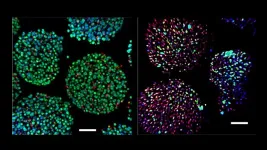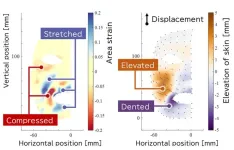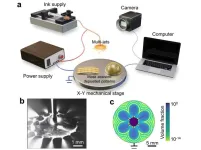(Press-News.org) EMBARGOED UNTIL 9:05 A.M. UTC ON NOV. 9, 2023
Sensitivity to common food allergens such as dairy and peanuts could be an important and previously unappreciated cause of heart disease, new research suggests – and the increased risk for cardiovascular death includes people without obvious food allergies.
That increased risk could be comparable to – or exceed – the risks posed by smoking, as well as diabetes and rheumatoid arthritis, the researchers report.
UVA Health scientists and their collaborators looked at thousands of adults over time and found that people who produced antibodies in response to dairy and other foods were at elevated risk of cardiovascular-related death. This was true even when traditional risk factors for heart disease, such as smoking, high blood pressure and diabetes, were taken into account. The strongest link was for cow’s milk, but other allergens such as peanut and shrimp were also significant.
The troubling finding represents the first time that “IgE” antibodies to common foods have been linked to increased risk of cardiovascular mortality, the researchers report. The findings do not conclusively prove that food antibodies are causing the increased risk, but the work builds on prior studies connecting allergic inflammation and heart disease.
Approximately 15% of adults produce IgE antibodies in response to cow’s milk, peanuts and other foods. While these antibodies cause some people to have severe food allergies, many adults who make these antibodies have no obvious food allergy. The new research found that the strongest link with cardiovascular death was in people who had the antibodies but continued to consume the food regularly – suggesting they didn’t have a severe food allergy.
“What we looked at here was the presence of IgE antibodies to food that were detected in blood samples,” said researcher Jeffrey Wilson, M.D., Ph.D., an allergy and immunology expert at the University of Virginia School of Medicine. “We don’t think most of these subjects actually had overt food allergy, thus our story is more about an otherwise silent immune response to food. While these responses may not be strong enough to cause acute allergic reactions to food, they might nonetheless cause inflammation and over time lead to problems like heart disease.”
Unexpected Food Allergy Findings
The researchers were inspired to investigate the possibility that common food allergies could be harming the heart after members of the UVA team previously linked an unusual form of food allergy spread by ticks to heart disease. That allergy, first identified by UVA’s Thomas Platts-Mills, M.D., Ph.D., is transmitted by the bite of the lone star tick, found throughout much of the country.
The allergy – commonly if inaccurately called the “red meat allergy” – sensitizes people to a particular sugar, alpha-gal, found in mammalian meat. The symptomatic form of the allergy, known as “alpha-gal syndrome,” can cause hives, upset stomach and breathing difficulties – even potentially deadly anaphylaxis – three to eight hours after affected people eat beef or pork. (Poultry and fish don’t contain the sugar, so they don’t trigger a reaction.)
To see if other food allergies could be affecting the heart, a team including Wilson, Platts-Mills and collaborators from UVA, as well as Corinne Keet, M.D., Ph.D., of the University of North Carolina, reviewed data collected from 5,374 participants in the National Health and Examination Survey (NHANES) and the Wake Forest site of the Multi-Ethnic Study of Atherosclerosis (MESA). Of those people, 285 had died from cardiovascular causes.
Among the NHANES participants, IgE antibodies to at least one food was associated with a significantly higher risk of cardiovascular death, the researchers found. This was particularly true for people sensitive to milk, a finding that held true among the MESA participants as well. Additional analysis also identified peanut and shrimp sensitization as significant risk factors for cardiovascular death in those individuals who routinely ate them.
“We previously noted a link between allergic antibodies to the alpha-gal red meat allergen and heart disease,” Wilson explained. “That finding has been supported by a larger study in Australia, but the current paper suggests that a link between allergic antibodies to food allergens and heart disease is not limited to alpha-gal. In some ways, this is a surprising finding. On the other hand, we are not aware that anyone has looked before.”
Allergies and the Heart
While this is the first time that allergic antibodies to common foods have been linked to cardiovascular mortality, other allergic conditions – such as asthma and the itchy rash known as eczema or atopic dermatitis – previously have been identified as risk factors for cardiovascular disease.
The researchers speculate that allergic antibodies to food may be affecting the heart by leading to the activation of specialized cells, called mast cells. Mast cells in the skin and gut are known to contribute to classic allergic reactions, but they are also found in the cardiac blood vessels and heart tissue. Persistent activation of mast cells could drive inflammation, contributing to harmful plaque buildup that can cause heart attacks or other heart damage, the researchers believe.
The scientists underscore, however, that this is not yet certain. It’s possible that other genetic or environmental factors could be at play. It’s even possible that cardiovascular disease could increase the risk for food sensitization – meaning that heart disease could up your risk for food allergies, rather than the other way round – though the new results suggest this is unlikely.
The researchers are calling for further studies to better understand the implications of their finding before recommending any changes in how doctors treat or manage food allergies.
“This work raises the possibility that in the future a blood test could help provide personalized information about a heart-healthy diet,” Wilson said. “Though before that could be recommended, we still have a lot of work to do understand these findings.”
Findings Published
The researchers have published their findings in the leading allergy journal, the Journal of Allergy and Clinical Immunology. The research team consisted of Keet, Emily McGowan, David Jacobs, Wendy Post, Nathan Richards,
Lisa Workman, Platts-Mills, Ani Manichaikul and Wilson. Wilson and Platts-Mills have received support from Thermo-Fisher/Phadia; a full list of the authors’ disclosures is included in the paper.
The research was supported by the National Institutes of Health’s National Institute of Allergy and Infectious Disease, grants 5U01AI125290, R37-AI20565 and R21AI151497; and by an AAAAI Foundation Faculty Development Award. A list of the financial backers of the MESA trial is available in the paper.
To keep up with the latest medical research news from UVA, subscribe to the Making of Medicine blog at http://makingofmedicine.virginia.edu.
END
Allergic responses to common foods could significantly increase risk of heart disease, cardiovascular death
Antibodies to allergens such as dairy, peanuts may up risk even for people without obvious food allergies, surprising new research reveals
2023-11-09
ELSE PRESS RELEASES FROM THIS DATE:
Antibodies to cow’s milk linked to increased risk of cardiovascular death
2023-11-09
Sensitivity to common food allergens such as cow’s milk and peanuts could be an important and previously unappreciated cause of heart disease, new research suggests – and the increased risk for cardiovascular death includes people without obvious food allergies.
In a paper published in The Journal of Allergy and Clinical Immunology that describes analyses led by Corinne Keet, M.D., Ph.D., pediatric allergy and immunology professor in the UNC Department of Pediatrics of two longitudinal studies, the authors show that the people who produced IgE antibodies to cow’s milk and other foods were at significantly increased risk of cardiovascular mortality. This was true even ...
Palaeo-CSI: Mosasaurs were picky eaters
2023-11-09
Joint press release Utrecht University and Natural History Museum Maastricht
The cradle of palaeontology – the study of fossil remains of animals and plants – lies in the Maastricht limestones, where the first Mosasaurus was discovered in 1766. The Dutch-Belgian border area around the Limburg capital is one of the best-explored areas in the world where Cretaceous rocks are concerned, the era that came to an abrupt end 66 million years ago. New data can now be added to all previous knowledge: the Maastricht mosasaurs turned out to be quite picky in their choice of diet. This ...
AI algorithm developed to measure muscle development, provide growth chart for children
2023-11-09
Leveraging artificial intelligence and the largest pediatric brain MRI dataset to date, researchers have now developed a growth chart for tracking muscle mass in growing children. The new study led by investigators from Brigham and Women’s Hospital, a founding member of the Mass General Brigham healthcare system, found that their artificial intelligence-based tool is the first to offer a standardized, accurate, and reliable way to assess and track indicators of muscle mass on routine MRI. Their results were published today in Nature Communications.
“Pediatric cancer patients often struggle with low ...
A breath of fresh air keeps drug-producing cells alive longer
2023-11-09
Cell-based therapies show promise for drug delivery, replacing damaged tissues, harnessing the body’s own healing mechanisms and more
But keeping cells alive to produce therapies has remained a challenge
Researchers used a smart, energy-efficient version of water splitting to produce oxygen for these cells
New approach maintains cells in vitro and in vivo, showing promise for both acute and chronic applications
EVANSTON, Ill. — In 2021, a Northwestern University-led research team received a Defense Advanced Research Projects Agency (DARPA) contract worth up to $33 million to develop an ...
Smartphones and smart speakers may be able to detect alcohol intoxication by analyzing voice patterns: Study
2023-11-09
By Kimberly Flynn
PISCATAWAY, NJ—Sensors in smartphones and smart speakers could help determine a person’s level of alcohol intoxication based on the changes in their voice, according to a new study in the Journal of Studies on Alcohol and Drugs.
Researchers at Stanford Medicine and the University of Toronto conducted a small study of 18 adults ages 21 and up. Participants were given a weight-based dose of alcohol and randomly assigned a series of tongue twisters—one before drinking, and one each hour up to seven hours after drinking.
The participants were asked to read the tongue twister aloud, and a smartphone was placed on a table withing ...
Forests with multiple tree species are 70% more effective as carbon sinks than monoculture forests
2023-11-09
To slow the effects of climate change, conserve biodiversity, and meet the sustainable development goals, replanting trees is vital. Restored forests store carbon within the forest’s soil, shrubs, and trees. Mixed forests are especially effective at carbon storage, as different species with complementary traits can increase overall carbon storage. Compared to single-species forests, mixed forests are also more resilient to pests, diseases, and climatic disturbances, which increases their long-term carbon storage potential. The delivery of other ecosystem services is also greater in mixed species forests, and they support higher levels of biodiversity.
Although the benefits ...
Umbilical cord milking appears to be safe in preterm infants born after 28 weeks
2023-11-09
WHAT:
A treatment to move blood from the umbilical cord into an infant’s body may provide a safe option for preterm infants born after 28 weeks who need rapid support, suggests a study supported by the National Institutes of Health. The procedure, called umbilical cord milking, involves gently squeezing the cord between the thumb and forefinger and pushing the blood into the newborn’s abdomen. The new findings suggest that concerns raised by a 2019 study of infants born before 28 weeks—which concluded that umbilical cord milking might increase the risk of bleeding inside the brain—do not apply to preterm infants born after 28 weeks. The ...
How human faces can teach androids to smile
2023-11-09
Osaka, Japan – Robots able to display human emotion have long been a mainstay of science fiction stories. Now, Japanese researchers have been studying the mechanical details of real human facial expressions to bring those stories closer to reality.
In a recent study published by the Mechanical Engineering Journal, a multi-institutional research team led by Osaka University have begun mapping out the intricacies of human facial movements. The researchers used 125 tracking markers attached to a person’s face to closely examine 44 different, singular facial actions, such as blinking or raising the corner of the mouth.
Every facial expression comes with a variety of local deformation ...
Grant helps program expand distracted driving education to online learning
2023-11-09
The National Highway Traffic Safety Administration (NHTSA) estimates there were 42,795 deaths resulting from motor vehicle crashes in 2022 in the United States. This projection is close to the previous year fatality numbers, which were the highest in 16 years.
A Herbert Wertheim School of Public Health and Human Longevity Science at University of California San Diego program aims to improve safety for all roadway users, including drivers, pedestrians and cyclists with support from a $360,000 grant from the California Office of Traffic Safety through the NHTSA.
To inform and promote safe driving, the UC San Diego Training, Research and Education for Driving Safety (TREDS) provides ...
HKUST researchers develop low-cost and multifunctional microprinter for ultrafast piezoelectric material printing
2023-11-09
A research team led by The Hong Kong University of Science and Technology (HKUST) has developed a microprinter that can print piezoelectric films 100 times faster for the production of microelectromechanical systems (MEMS) for sensors, wearable or implantable medical devices, offering the possibility to lower the mass production costs.
The microprinter, built at a comparatively lower cost as compared with other printers on the market, utilizes an electrostatic field to propel streams of ink onto a platform, allowing for efficient manipulation of thin film patterns and enhanced printing speed to address the challenge of mass production ...
LAST 30 PRESS RELEASES:
DGIST identifies “magic blueprint” for converting carbon dioxide into resources through atom-level catalyst design
COVID-19 vaccination during pregnancy may help prevent preeclampsia
Menopausal hormone therapy not linked to increased risk of death
Chronic shortage of family doctors in England, reveals BMJ analysis
Booster jabs reduce the risks of COVID-19 deaths, study finds
Screening increases survival rate for stage IV breast cancer by 60%
ACC announces inaugural fellow for the Thad and Gerry Waites Rural Cardiovascular Research Fellowship
University of Oklahoma researchers develop durable hybrid materials for faster radiation detection
Medicaid disenrollment spikes at age 19, study finds
Turning agricultural waste into advanced materials: Review highlights how torrefaction could power a sustainable carbon future
New study warns emerging pollutants in livestock and aquaculture waste may threaten ecosystems and public health
Integrated rice–aquatic farming systems may hold the key to smarter nitrogen use and lower agricultural emissions
Hope for global banana farming in genetic discovery
Mirror image pheromones help beetles swipe right
Prenatal lead exposure related to worse cognitive function in adults
Research alert: Understanding substance use across the full spectrum of sexual identity
Pekingese, Shih Tzu and Staffordshire Bull Terrier among twelve dog breeds at risk of serious breathing condition
Selected dog breeds with most breathing trouble identified in new study
Interplay of class and gender may influence social judgments differently between cultures
Pollen counts can be predicted by machine learning models using meteorological data with more than 80% accuracy even a week ahead, for both grass and birch tree pollen, which could be key in effective
Rewriting our understanding of early hominin dispersal to Eurasia
Rising simultaneous wildfire risk compromises international firefighting efforts
Honey bee "dance floors" can be accurately located with a new method, mapping where in the hive forager bees perform waggle dances to signal the location of pollen and nectar for their nestmates
Exercise and nutritional drinks can reduce the need for care in dementia
Michelson Medical Research Foundation awards $750,000 to rising immunology leaders
SfN announces Early Career Policy Ambassadors Class of 2026
Spiritual practices strongly associated with reduced risk for hazardous alcohol and drug use
Novel vaccine protects against C. diff disease and recurrence
An “electrical” circadian clock balances growth between shoots and roots
Largest study of rare skin cancer in Mexican patients shows its more complex than previously thought
[Press-News.org] Allergic responses to common foods could significantly increase risk of heart disease, cardiovascular deathAntibodies to allergens such as dairy, peanuts may up risk even for people without obvious food allergies, surprising new research reveals






